Letting Go of the Doctor
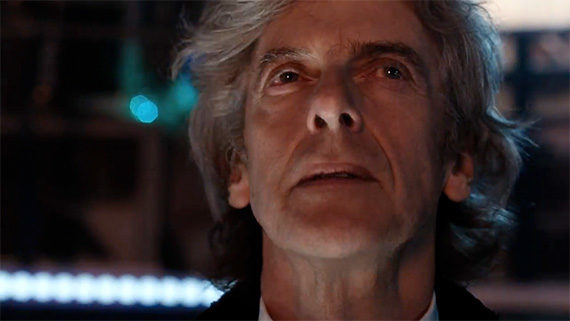
Feature article by guest contributor Zachary Schulman.
Here we all are, outside the era of the Twelfth Doctor, with an understandable array of mixed feelings. Losing Peter Capaldi, in what feels to me like a loss anyway, is the transition into a time of reflection for many of his fans. Since the possibilities for the show’s future are unbound to limitations, we also feel a bright ray of hope for what is in store with our Thirteenth Doctor. Now that hindsight dawns upon my horizon, for the passing of a man whom I count among my role models, I can begin to examine the legacy of the Twelfth Doctor.
 Shock – that was my reaction when a friend texted me the name Peter Capaldi one summer’s day many years ago, and I narrowed his face down to series four’s “The Fires of Pompeii.” Another friend of mine had convinced me that the Twelfth Doctor would be Idris Elba. Being on the Luther bandwagon and all, the transformation appealed to my desire for something new and hopefully gritty. My first mistake upon learning of the man who would soon be a role model for many was for me to place expectations upon him. It was my expectations that blocked me off from seeing the brilliant character that had been presented to me. All of us who viewed Peter Capaldi’s first appearance were asked at the episode’s close to “just see” him, and forget the fantasy we carry. It took me quite a while to see him, as I was married to the idea of a character that simply did not exist.
Shock – that was my reaction when a friend texted me the name Peter Capaldi one summer’s day many years ago, and I narrowed his face down to series four’s “The Fires of Pompeii.” Another friend of mine had convinced me that the Twelfth Doctor would be Idris Elba. Being on the Luther bandwagon and all, the transformation appealed to my desire for something new and hopefully gritty. My first mistake upon learning of the man who would soon be a role model for many was for me to place expectations upon him. It was my expectations that blocked me off from seeing the brilliant character that had been presented to me. All of us who viewed Peter Capaldi’s first appearance were asked at the episode’s close to “just see” him, and forget the fantasy we carry. It took me quite a while to see him, as I was married to the idea of a character that simply did not exist.
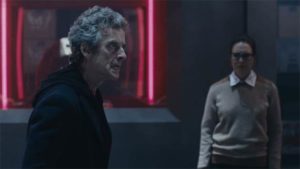 The Twelfth Doctor’s legacy for me, in part, is the lesson of letting go. When we release feelings like restraint, the future’s outlook becomes more magical. Months ago, I asked myself, what is holding me back from loving this story? The answer goes something along the lines of: I cannot connect to a person who isn’t there. “The Zygon Inversion” speech in series nine found me at a loss for words, as I realized that there is something of myself that I can see in the Twelfth Doctor. Instead of broadcasting an illusion of who this character is, the erroneous signal in my mind just clicked off. That moment of profound emotional release as the Twelfth Doctor expressed himself so profoundly was the beginning for me of “seeing” him.
The Twelfth Doctor’s legacy for me, in part, is the lesson of letting go. When we release feelings like restraint, the future’s outlook becomes more magical. Months ago, I asked myself, what is holding me back from loving this story? The answer goes something along the lines of: I cannot connect to a person who isn’t there. “The Zygon Inversion” speech in series nine found me at a loss for words, as I realized that there is something of myself that I can see in the Twelfth Doctor. Instead of broadcasting an illusion of who this character is, the erroneous signal in my mind just clicked off. That moment of profound emotional release as the Twelfth Doctor expressed himself so profoundly was the beginning for me of “seeing” him.
Connections and parallels came to me then, regarding the legacy of the entire programme. The Twelfth Doctor is the reboot of the First Doctor, but with 2010s’ sensibilities. The Twelfth Doctor survived a great war of his own, the Last Great Time War, and the First Doctor was inspired from Britain’s triumph surviving the World Wars. Peter Capaldi’s incarnation gives us a glimpse, again, of who the Doctor truly is, right before he makes what is perhaps the greatest change of his life.
![]() Both Doctors fall at the hands of the Mondasian Cybermen, the First Doctor in a never-before- hand meeting, and the Twelfth Doctor at the moment of their genesis. The Cybermen are a special kind of villain, one that reflects upon the darkness of who we truly are among our other complex traits. The Doctor is far more than a dehumanized, cold soldier. The Doctor is warm, has a twinkle in his eyes, and he even undertakes the burdens of kindness. The architect of the universe’s destiny, the repairman of broken lives, and the rebel of the Time Lords continues to teach me how to be a better person. The lessons planned for me in series eleven and beyond are counted among my many curiosities.
Both Doctors fall at the hands of the Mondasian Cybermen, the First Doctor in a never-before- hand meeting, and the Twelfth Doctor at the moment of their genesis. The Cybermen are a special kind of villain, one that reflects upon the darkness of who we truly are among our other complex traits. The Doctor is far more than a dehumanized, cold soldier. The Doctor is warm, has a twinkle in his eyes, and he even undertakes the burdens of kindness. The architect of the universe’s destiny, the repairman of broken lives, and the rebel of the Time Lords continues to teach me how to be a better person. The lessons planned for me in series eleven and beyond are counted among my many curiosities.
The Cybermen function here in the finale in a much more profound way than described in my previous article, “Why the Cybermen Are Now More Threatening than the Daleks.” The themes of romantic fluidity cannot be ignored in the infrastructure of the Twelfth Doctor’s final episodes. The Cybermen are presented here as something much more than a vague metaphor about consumerism or zombie mindsets. Instead, the Cybermen are those people who are told to suppress their true, romantic selves, because signals from the upper echelons of society broadcast repression. Bill Potts, a lover, proud of her true self, is given the ultimate challenge of escaping society’s clutches as a repressed, genderless and unfeeling machine doing as she is told.
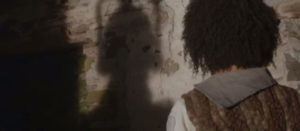 Repression leads to depression, and depression leads to self-deletion. The lover and explorer archetypes liberate Bill from her enslavement in the form of escapism. Heather, the Pilot, returns at the end of the series’ finale and the newly minted couple leave the Mondasian society existing at the edge of collapse near a black hole for other places; better meadows that will accept them for who they are. If all else fails, they can run with each other forever. Time Lords are canonically transcendent to gender, so the desire to remain a man indefinitely and to simply die as he is instead of accepting his true colors becomes an impasse for the Twelfth Doctor as well. Eventually, the Twelfth Doctor lets go of his restraints in the hope that he will again feel happiness and acceptance. The First Doctor could never express his emotions as the Twelfth Doctor has because the former incarnation represented a time where romantic deviations were totally out of the question for social norms.
Repression leads to depression, and depression leads to self-deletion. The lover and explorer archetypes liberate Bill from her enslavement in the form of escapism. Heather, the Pilot, returns at the end of the series’ finale and the newly minted couple leave the Mondasian society existing at the edge of collapse near a black hole for other places; better meadows that will accept them for who they are. If all else fails, they can run with each other forever. Time Lords are canonically transcendent to gender, so the desire to remain a man indefinitely and to simply die as he is instead of accepting his true colors becomes an impasse for the Twelfth Doctor as well. Eventually, the Twelfth Doctor lets go of his restraints in the hope that he will again feel happiness and acceptance. The First Doctor could never express his emotions as the Twelfth Doctor has because the former incarnation represented a time where romantic deviations were totally out of the question for social norms.
“I see your true colors, and that’s why I love you.” Cover of “True Colors” by Phil Collins. “Your true colors are beautiful, like a rainbow.”
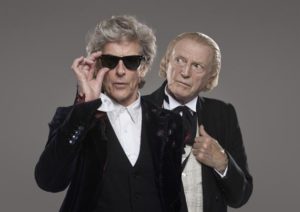 I believe the TARDIS was very wise in bringing the First and Twelfth Doctors together at a moment of profound transformation which paralleled across millennia of life experience. The big picture, that even the Doctor as a Time Lord cannot always realize, reminds even all of us of our greatest strengths. The Doctor of War will always be an exemplary role model of kindness in an otherwise indifferent universe. Whomever the Doctor transforms into as he explores his connection with the rest of the universe, and everyone in it, he will forever retain the man he originally was. Even in so radical a time in our world, with barriers being shifted across many cultures, perhaps so does understanding flow in due course – even if it takes lifetimes.
I believe the TARDIS was very wise in bringing the First and Twelfth Doctors together at a moment of profound transformation which paralleled across millennia of life experience. The big picture, that even the Doctor as a Time Lord cannot always realize, reminds even all of us of our greatest strengths. The Doctor of War will always be an exemplary role model of kindness in an otherwise indifferent universe. Whomever the Doctor transforms into as he explores his connection with the rest of the universe, and everyone in it, he will forever retain the man he originally was. Even in so radical a time in our world, with barriers being shifted across many cultures, perhaps so does understanding flow in due course – even if it takes lifetimes.
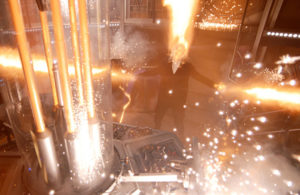 The Twelfth Doctor’s legacy is not that of conclusions and of resolutions. Rather, the Twelfth Doctor’s era has far more to do with character reflection and affirmation than his predecessor’s tenure. Instead of utilizing the tried and true overarching universal crisis plot, such as the Eleventh Doctor’s battles against the Silence movement, the Twelfth Doctor shall be remembered for the poetry by which his character was examined. If I had only one word that I could use to describe Peter Capaldi’s era it would be introspection. Series eight does a remarkable job in asking the question if the Doctor is a good man or not. Series nine challenges the audience with the Doctor’s past on Gallifrey, and if the Doctor is some sort of hybrid warrior. With series ten now concluded, the acknowledgement by the programme of the sweeping political movements that continuously transform our world, so begins the chapter of the Doctor’s life through a woman’s eyes.
The Twelfth Doctor’s legacy is not that of conclusions and of resolutions. Rather, the Twelfth Doctor’s era has far more to do with character reflection and affirmation than his predecessor’s tenure. Instead of utilizing the tried and true overarching universal crisis plot, such as the Eleventh Doctor’s battles against the Silence movement, the Twelfth Doctor shall be remembered for the poetry by which his character was examined. If I had only one word that I could use to describe Peter Capaldi’s era it would be introspection. Series eight does a remarkable job in asking the question if the Doctor is a good man or not. Series nine challenges the audience with the Doctor’s past on Gallifrey, and if the Doctor is some sort of hybrid warrior. With series ten now concluded, the acknowledgement by the programme of the sweeping political movements that continuously transform our world, so begins the chapter of the Doctor’s life through a woman’s eyes.
The Thirteenth Doctor, as well as the show’s many fans, will have to learn about her purpose in transforming in such a brand-new way. I eagerly await hindsight though I will settle, of course, with the adventures to come as Jodie Whittaker takes the keys and travels with us further down the path of our shared future. Just as the Twelfth to Thirteenth Doctor’s regeneration completes, what I assume is his wedding ring to River Song falls off of her new finger. The Thirteenth Doctor marks the passage of the character’s centuries’ old notion of being married to the idea of the Doctor as a man. In the wisdom of Peter Capaldi, “Doctor, I let you go.”








